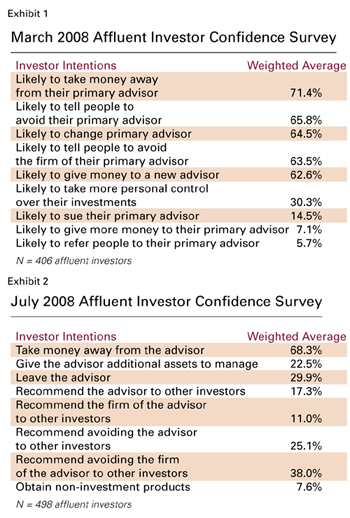A position of openness and calmness will help a great deal when a customer complains. Under the circumstances, it's a good idea to immediately thank the client for speaking up. Generally a polite "thank you" disarms an upset customer, and you're more likely able to have a normal conversation with them. I've consulted with dozens of organizations and thousands of individuals about the "complaint as a gift" concept, and I know for a fact that immediately thanking customers works.
After you have thanked your complaining customers, tell them that you're glad they called because it gives you a chance to go over their account and to evaluate their investments in the context of current market conditions. If you think the ride is going to be turbulent for the next 18 months, it's a good idea to be honest with your client. Find out what you need to do to retain their business. After all, it's their money, and when they are nervous, simply talking them into your point of view may backfire. You may be offering the best advice, but you could end up losing them if you push them into making a move they are hesitant about. That serves no one.
This is a good time to indicate anything else you can do for them. This may mean checking back with them more frequently than you usually do. Keep calling them back until they feel assured you are doing everything you can to help them. The airline industry has something to teach us about handling complaints. Cathay Pacific, the Hong Kong-based air carrier, found that it wasn't the fact that luggage was lost or delayed that determined whether passengers would fly with them again. It was how the incident was handled. When your luggage doesn't arrive with you, it's nice when the person behind the counter is sympathetic and understands the difficulties that delayed or lost luggage can create. It doesn't get your luggage back to you any faster, but it's comforting to have that moment of sympathy. Financial investors also want acknowledgement of their concerns.
Researchers of Swedish banks found that branch managers who used complaint handling as their primary tool for creating long-term customer satisfaction ran the most successful branches. These managers didn't run away from complaints; they listened to their customers and considered feedback as having value.
It's important to remember that if your customers leave you because the market is bad and they put their money in the hands of a competitor, that customer is going to face the same bad market. So, they might as well stay with you. But there's no way your clients will do that if you are avoiding them or are unwilling to engage them-especially in difficult economic times. The market may be bad, but that doesn't mean we have to make the situation worse by also alienating our clients.
Janelle Barlow, Ph.D. is an authority on business complaints and resolution. Twice awarded the prestigious "International Trainer of the Year" award, she has worked with more than 250,000 people and hundreds of organizations on all continents. She is the author of the best-selling business book, A Complaint Is a Gift: Recovering Customer Loyalty When Things Go Wrong, which has been in print for 12 years and translated into 21 languages. A revised edition was released in October 2008 by Berrett-Koehler Publishers. More information is available at www.tmius.com.









